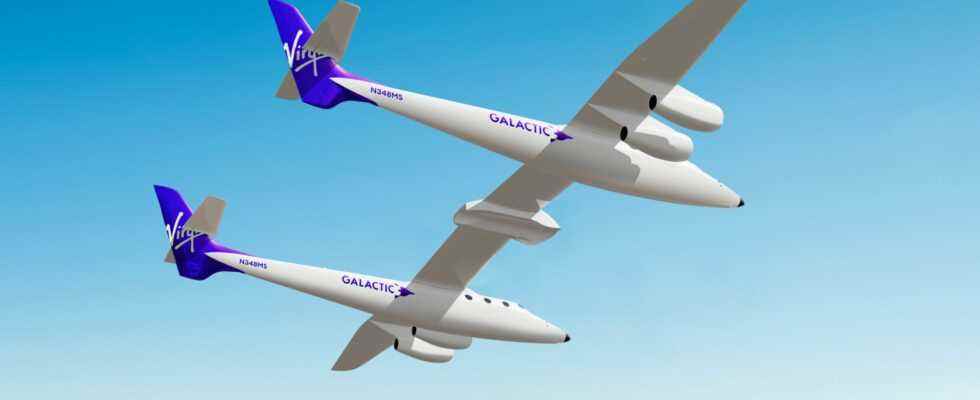To be able to significantly increase its future rate of flights, Virgin Galactic has ordered two new carrier aircraft from Aurora, a Boeing subsidiary. The first copy will be delivered in 2025. But, until then, it will still be necessary to show the capabilities of the rocket planes they will carry!
It’s been a year since the VSS Unity flew.
Eve will have reinforcement
It’s good when there is no income to invest, right? Whether this maxim is true or not, it applies to Virgin Galactic. The company announced on July 6 that it was purchasing two new carrier aircraft from Aurora Flight Sciences, a division of Boeing. These will support the venerable “VMS Eve” of the WhiteKnightTwo type, which has been flying in the service of the company since 2008.
Eve is currently undergoing, and since last fall, a major campaign of revision and preparation for future commercial operations in the coming years. Nevertheless, the aircraft is showing its age, and Virgin is considering a major increase in its tourist flights to the frontier of space.
Fly high, and often
The two carriers will therefore have, like the VMS Eve, the mission of transporting the rocket planes VSS Unity, VSS Imagine and their successors up to an altitude of almost 15 kilometers before dropping them on a very precise point.
However, it should be noted that neither Virgin Galactic nor Aurora have mentioned technical details on the devices. Will they be identical to the VMS Eve with a more modern design, or will they adopt a different design? In any case, they will have to support up to 200 “carry/drop” flights per year, with easy maintenance and a first delivery expected in 2025. The final phase of their assembly will take place at Virgin Galactic in Mojave (California) .
And for one more credit…
Nevertheless, this command can query, especially because of the Virgin Galactic situation. The company continues to dilute its value in shares (which have lost half their value of last year) and to raise funds… Indeed, it has no income, and has been for almost 20 years. In the past two years alone, losses have been around one billion dollars, and the first quarter of 2022 was no exception (93 million losses).
SpacePort America should not resume service before the end of the year for test flights of the carrier VMS Eve and VSS Unity. The first real commercial flight has been pushed back to the first quarter of 2023, and it’s already been almost a year since the iconic founder of Virgin Galactic, Richard Branson, was able to realize his dream in the rocket plane. In this context, and knowing that Virgin has only succeeded in four suborbital flights so far, it is difficult to believe in rates of 200 flights per year. When it went public in 2019, the company anticipated 4 rocket planes, 170 flights and $400 million in revenue… in 2022.
Since July 2021, Virgin Galactic’s only competitor, Blue Origin, has flown 26 passengers, with a rate of one flight approximately every two months and which could increase. More realistic?
Source :SpaceNews

5